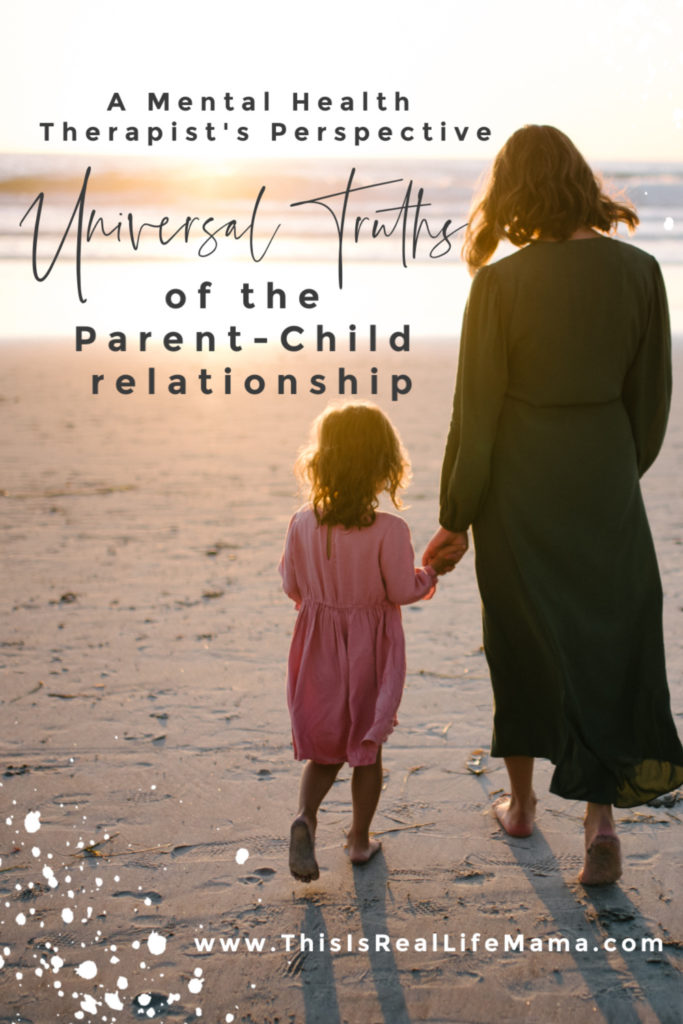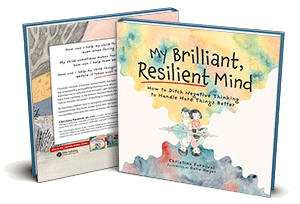10 Universal Truths of the Parent-Child Relationship
Hi there! I’m Christina, a mom of two littles, a licensed mental health therapist, and a soon-to-be children’s book author! Thanks for checking out my site. Look around! I’m sure there’s something here for you! In this post you’ll find a mental health therapist’s perspective on the universal truths of the parent-child relationship.
With over a decade of experience in the mental and behavioral health field, I have worked with many families from many different backgrounds in a variety of circumstances. I have heard and seen a lot. In doing so, it is clear that we are all so much more alike than we are different.
No matter who you are, where you from, or what language you speak, there appear to be many universal truths to parenthood. I have chosen 10 universal truths of the parent-child relationship to share with you here.
These may be simple on the outset — I ask you to let them sink in. Really think about them, and note how you engage with your child in relation to these truths. They are a key component of improving your parent-child relationship.

10 Universal Truths of the Parent-Child Relationship
- Children need LOVE
Children need to feel loved, both when they are being lovable, AND when they are acting unloveable. They need to know that you will be there for them no matter what. (Love and affection are important when it comes to discipline approaches..read about that here.) - Children crave structure
Structure makes children feel safe. The big world feels smaller, contained, and predictable when the child has consistent and loving routine and structure. A life without structure feels chaotic and scary. - Children don’t want you to be their friend
As much as your children love having fun with you, they need you to be the boss. They feel secure when you take charge and set limits for them. - Children want to do what’s right
Children love knowing they’ve pleased their parents. They really do want to do what we expect of them. Sometimes, however, we parents set our children up for failure by not clearly defining rules and expectations. Rules should be clear, simple, and stated ahead of situations in which they arise. You’d be amazed how much this makes a difference in behavior. - Children deserve respect
Respect is a two-way street, and children will be more likely to give you respect when they receive it from you first. The saying that people will not “care how much you know until they know how much you care” is as true with children as it is with any adult. - Children are constantly watching what you do
Parents often expect their children to “do as I say and not as I do”, but it’s clear that does not work. Children mimic their model: you. Watch your words and your actions — they certainly are. - Children respond well to calm and sincere conflict resolution
A heart-to-heart conversation in a moment of calm will always work better than yelling in the heat of the moment. Children require the guidance of a loving adult to sincerely explain how their behavior affects those around them. (If you’re curious how to manage conflict resolution with your spouse, click here.) - Children need you to really be there
Being present with your child is very different from being around your child. They can tell if you’re not really there. Children love having your full attention and focus. This can do wonders for decreasing misbehavior. - Children develop their sense of self from your messages to them
Children blossom and feel good in who they are when they know that you are proud of them, believe in them, and take interest in what they do. Children will become what you expect of them, call them, or say about them, so make sure it’s positive. - Children want to see you happy and well
One of the best ways to care for your children is to show care and love to yourself. Work on yourself and show them that you know you matter. They think, “mom and dad think they are worthwhile; therefore I am worthwhile too.” Plus when you’re doing well, you’re a lot more fun.
The parent-child relationship is a special one that deserves lots of a love and care. It is one of the most complex relationships we will ever have, and one of the most rewarding.
When you look over this list of the 10 Universal Truths of the Parent-Child Relationship, pay attention to any that make you feel uncomfortable.
Discomfort signals to you an area where you have some work to do. And when you make some changes, you’ll see some change, and you’ll be glad you did.



I LOVE this article!!! This is right on topic with what i blog and teacH about. Xx
If only more people would believe and practice this, we would have a much happier society.
Wow, what a beautiful post and very true! I love my son more than anything in this world and pray he grows up to be a wonderful human being, but I have to help him get there. Thanks for these beautiful reminders! ❤️
none of us will be perfect parents, but these are really good habits to strive for on a consistant basis. Thanks for sharing!
Such a good list to keep in mind – thanks!
Beautiful post! I just love your inspiring ways that you share your knowledge!
The calm & sincere really is the one I need to remind myself
I love the structure part. It is so important! As many of these are. Great tips!
Its clear you know and care a great deal about this topic. Im sure it will be a great help to many.
Great advice! I love it and will IMPLEMENT it in my own life!
Children don’t want you to be their friend
As much as your children love having fun with you, they need you to be the boss. They feel secure when you take charge and set limits for them…… I COULDN”T AGREE WITH THIS MORE AND WISH EVERY PARETN WOULD READ THIS
As a former elementary teacher and principal, I always believed and acted this way. I am glad to see I was on thE right track. Such a goid read.
Fantastic post! I think that children need respect is a good point. As parents we tend to think that children only need to respect their elders, but how do they learn that if we don’t teach that, and respect them too? thanks for sharing.
children learn by example. And, there is some good reminders and ways that are listed to help to be an example.
Loved reading this! As a first time mama, this is all good information for me to know.
Wonderful points for all those mama’s and fathers out there!
I love this. The respect one is so important. I have a 14 and 18-years-old and to me that is one of the most important things I can show them.
These are so timely….i wished everyone would heed your advice…the world would be a better place.
These are great reminders!
These are all excellent reminders, especially to love children when they are being unloveable. That does seem to be the time they need it most.
This COULDnt be further than the truth. I am glad you shared this. thank you.
I have 3 children and my oldest thrives on structure. The other 2 are fly by the seat of pants kind of kids, like their mother! 😉
Great info! I’m going to share this on my mental health business’ facebook page!
It’s interesting because I see my boys wanting more of the friendship to develop versus the parental authority. I do think the dynamics change once they hit teen years…but I can definitely see most of this being applicable for littles.
Great list! I can tell when I am not totally present for my son…he will definitely act up. but it is a good reminder to be in the moment.
i ALWAYS HAD THE PROBLEM OF STAYING CALM IN THE “HEAT OF THE MOMENT”. SO WE LEARNED TO WALK AWAY, CALM DOWN, AND COME BACK AND DISCUSS THE MATTER.
I COULDNT AGREE MORE! OUR DAUGHTER IS AUTISTIC SO ALL OF THIS IS EVEN MORE IMPORTANT WITH HER!